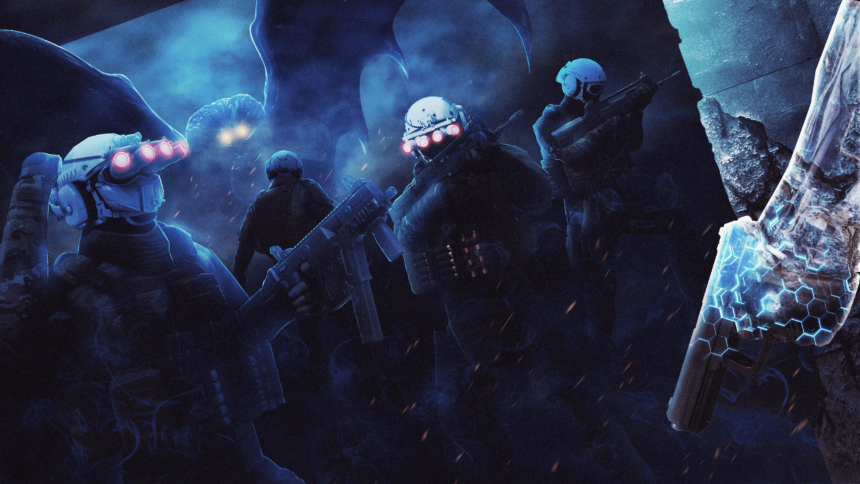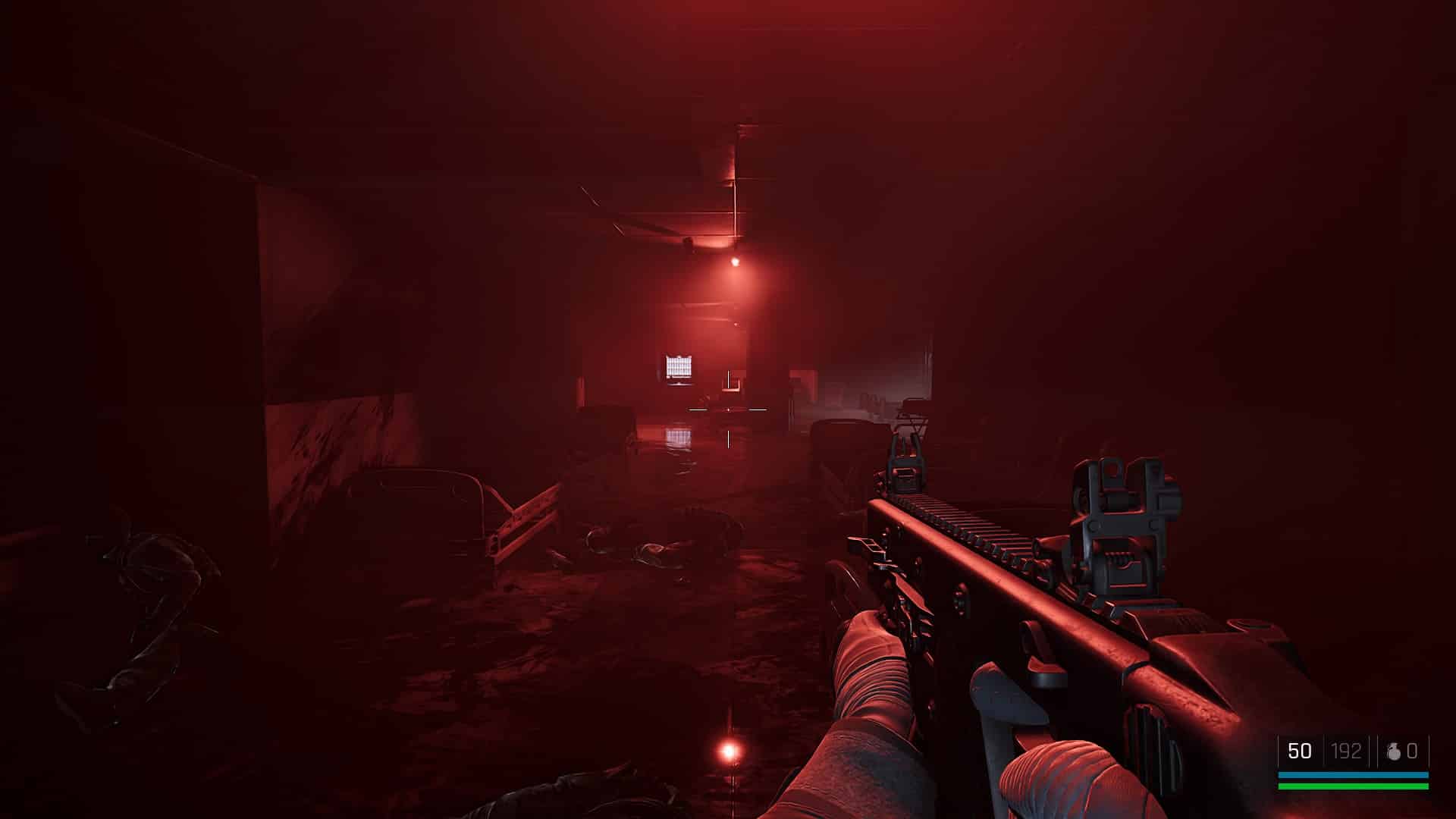I love F.E.A.R., and it has bothered me for years that no studio tried to replicate that series meaningfully. Even the subsequent sequels didn’t have the same magic the first FEAR entry possessed. Enter Trepang2, a game I’ve been following for years which instantly grabbed my attention due to the ridiculously similar gunplay, dimly-lit environments, crazy destruction, and a hint of horror looming in the shadows. In my Trepang2 review, I’ll discuss if this game truly is the successor you’ve been waiting for, or if Monolith Productions’ seminal title remains untouched.
Gunplay and Game Feel
Trepang2 plays a lot like a faster version of the original FEAR. You can’t aim down the sight, but the weapon recoil always feels manageable. You have access to a variety of weapon classes, and the ability to customize those to your liking at various benches throughout the game world. Each weapon, from the handgun to the machine gun feels responsive, tight, and impactful.

The game sells each kill with excellent feedback, enemy reactions, and appropriate recoil. Nothing feels imprecise, your movements don’t feel floaty and there’s no mouse acceleration to slow things down.

Switching between weapons is fast, and reliable, and the reload animations are detailed but not overlong. You’re never at the whims of some realistic military-sim quirks, and the power fantasy of dual-wielding SPAS-12 as you paint the walls with viscera is achievable and encouraged. It’s hilarious seeing Subject 106 (the main character) reload two shotguns, one in each hand as he slides down a row of enemies, shooting their helmets off.

Before I go any further, if you just wanted a game that feels amazing to play and does enough to simulate and possibly improve the FEAR combat experience, you can stop reading now, and go play Trepang2. It’s absolutely worth a playthrough solely for its visceral, and satisfying gunplay alone.

Sadly, there’s a lot that Trepang2 doesn’t get right, and that’s mostly outside of the actual gunplay.
Subject 106’s Abilities
Subject 106 can turn invisible, slow down time, and dual-wield weapons of the same class. Out of these, you’ll be regularly using bullet time and dual-wielding, but invisibility is usually reserved for getting out of combat rather than full-blown stealth. I found the bullet time implementation in this game pretty overpowered, and I honestly think it should be nerfed a little.

You can stay in bullet time for an extended period, headshot a string of enemies, regain bullet time through combat again and continue to destroy entire squads without fear. I stopped using this ability to keep things interesting and reserved it for moments when I was near death.
The visual effect of slowing down time reminded me a lot of the original FEAR as well, and it looks fantastic. Tripping enemies as you shoot them in bullet time, seeing their helmets fly off, with their weapons suspended in the air is a treat. I still maintain that this ability is a bit OP, but for your first playthrough, you should go crazy and fulfill your first-person Max Payne/John Wick power fantasy of creating chaos.
Enemy Variety and Boss Fights
There aren’t a whole lot of enemy types in this game and essentially boils down to how much armor the human enemies are wearing. The regular ones can be instantly killed with a headshot, while a slightly advanced type will take two headshots to remove the helmet first. There are also heavier soldiers with tons of armor, and you’ll spend a bunch of time shooting them.

I think the regular enemies are fun to fight, and you can feel a hint of that FEAR AI in their movement and tactics. However, since this game leans into the supernatural as well, there are a few enemy types in that category too. I didn’t find fighting those fun, and it felt like I was playing a different game suddenly. Your movement feels restricted, and their general design doesn’t contrast well with the game’s overall presentation.
The boss fights are incredibly disappointing, and they summon mobs throughout the fight. One of the bosses even brings out a previous boss during the fight, which felt completely out of place. Taking down bosses is relatively easy as well because you can stand behind them, turn on bullet time, and shotgun away their health to smithereens in seconds.
They don’t have interesting designs, gimmicks, or moves and end up feeling quite generic. The final boss does a bit to alleviate this problem and is interesting until it also summons a bunch of mobs.
Presentation: Visuals and Audio
Trepang2’s opening levels are its strongest and I think this game nails how it handles darkness. I like how at times the only source of light is the actual gunfire from your enemies, and you feel like an actual stalker on the hunt.

Red warning lights illuminate otherwise dark hallways, and smoke gathers at your footsteps to create a thick layer of atmosphere as you explore hallways with power failures.

The visuals are great, and the destruction on display is fantastic. I loved turning environments into debris, with pages flowing, gore splattered around, and even on your weapon.

The way your grenades create this wormhole effect is completely exaggerated but looks amazing. Throwing incendiary grenades in a hallway to burn everyone in sight, and seeing the lasers of enemies to stop them from a distance, all add to the fantastic presentation of the game.

There are a few visual bugs here though, and I saw objects suspended in the air a couple of times. It’s nothing that gets in the way of the game though, and feels funny.

The visual presentation is one of the highlights of our Trepang2 review.
Audio Issues
The sound is a bit of a mixed bag though. The actual weapons sound great, are very loud, and add to the impact of each shot. However, when things get a bit too crazy with 15 grenades flying toward you, the sound mixing isn’t handled well. It may just be my headphones, but the audio goes from loud to completely distorted. It’s an unpleasant effect and doesn’t feel intentional.
Music tracks switch abruptly without any proper transition, and character dialogue triggers based on your location, often cutting over each other. This means you can miss out on key dialogue if you ran a bit fast.
Why Is There a HUB Area?
In Trepang2, there is a HUB area where you can choose missions, customize your character, and weapons, and use the combat simulator. There is no direct contact with any character here apart from the Quartermaster who is behind a window anyway with no direct interaction.

I can’t fathom why the game needed all this when it could’ve just been a few menus that you accessed after the end of each mission.
You need to run around this place, assign yourself a main or side mission, and then run back to the hangar ly begin the mission. It hurts the pacing and doesn’t feel like a useful addition, gameplay-wise or narratively.
This is especially weird because the actual load times in this game are non-existent, so simply selecting things from those menus would drop you into missions incredibly faster.
Repeatability
Trepang2 took me around 6 hours to complete, and I didn’t complete all the side missions available. I think the campaign length is adequate because each mission feels quite long. You have access to side missions as well, which are usually larger open areas with wave-based encounters. These are essentially shooting arenas, and I had a lot of fun with them.

This adds to the repeatability of the game, and there are over 6 difficulty levels to choose from. For anyone familiar with shooters, I recommend at least the “Hard” difficulty. As I mentioned above, the abilities feel quite powerful, and I didn’t have much trouble with this difficulty. I replayed a mission on “Normal”, and that felt way too easy.
Story, Characters, and Horror
The story and dialogue is possibly the weakest part of the game. You’ll have a pretty decent idea of what the motivations of the rival organizations are in the first hour or so. The game is as subtle as a brick with its dialogue, and the themes it’s trying to explore.

The world’s lore is also presented in the dullest way possible with intel scattered around each level in the form of documents, and laptops. I don’t want to read things as a super lab-made killing machine, I want to shoot things and turn them into wallpaper.

This brings us to the horror elements, which don’t take the proper time to develop. Cheap jump scares, mismatched enemy designs, and random visions don’t elicit fear, but boredom. I couldn’t wait for that stuff to pass, because it wasn’t as carefully orchestrated as its influence, FEAR, which takes the necessary time, and careful environmental trickery to create a descent into full-blown supernatural horror.

The voice acting is pretty solid, and seeing names like Gianni Matragrano pop up was great to see. The delivery of cheesy lines with a sense of believability complimented the tone of the game, despite the predictable plot.
Verdict
Overall, I think Trepang2 delivers on the gameplay but doesn’t quite live up to everything that made the original F.E.A.R. special. There are hints of brilliance here, and there is a lot of potential to improve the experience in the sequel, but outside of the excellent gunplay, and presentation, Trepang2 doesn’t quite justify the elements it sets up.

The horror aspect feels undercooked, the story is incredibly predictable, and the HUB feels like an unnecessary addition that hurts the pacing. I still recommend playing through it for the chaotic combat, and destruction, which the game absolutely nails.
What did you think of our Trepang2 Review? Share what you think about it in the comments below.
This review is based on the PC version of Trepang2. The key was provided by Team17.











